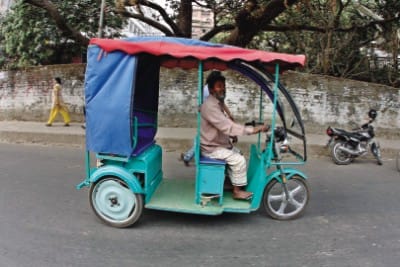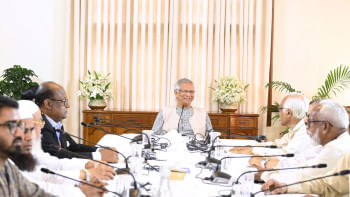Electric 3-wheelers still ply without legality

Electric three-wheelers run in the capital without registration with drivers having no licence.Photo: STAR
Around a thousand electric three-wheelers are plying streets of Dhaka without registration or permission since authorities concerned are yet to set any rules for them. A year has gone by since these vehicles were introduced.
There is confusion about who is supposed to deal with the vehicles --Bangladesh Road Transport Authority (BRTA) or Dhaka City Corporation (DCC) -- while the Motor Vehicle Ordinance, 1983, does not say which category the vehicle should be in.
The three-wheelers that resemble Mishuks are powered by rechargeable batteries. As they are eco-friendly, cheap to buy and run, sales of the three-wheelers picked up despite confusion over its legal status.
Many drivers of the vehicles also do not have any sort of licence.
Rafiqul Islam, director (engineering) of BRTA said, "We have authority over all motorised vehicles on land but this particular three-wheeler type is neither completely motorised nor non-motorised. The Motor Vehicle Ordinance, 1983, has no specific definition or clause regarding electric vehicles.
"We fix registration fees or road taxes depending on the vehicles category. Without defining its type we cannot do anything," he added.
The electric three-wheelers are popularly known as Borak, E-Bike, Easy Bike, City Bike, etc. It is also being called China Rickshaw.
The vehicles are now being used in 17 districts. Municipality offices outside Dhaka are providing registration for the vehicles and licences to drivers. The ones in the capital are running without any documentation.
According to assemblers of the vehicles, there are roughly 5,000 electric three-wheelers in the country. There is no official estimate.
Meanwhile, the DCC, responsible for licensing non-motorised vehicles in the city is considering replacing human-powered rickshaws with the electric three-wheelers. A committee comprising officials of BRTA, Roads and Highways Department and the DCC has been set up to examine its feasibility.
Head of the committee BM Enamul Haque, general manager (transport) of the DCC, said, "These vehicles can provide employment to a lot of people. A proposal has been sent to the LGED [Local Government Engineering Department] in this regard. Discussions will start soon."
The official also said a letter was sent to the department of mechanical engineering of Bangladesh University of Engineering and Technology asking it to identify the vehicle's category.
After a four-hour recharge from a regular power outlet at homes, the vehicles get a range of up to 120km and tops out at 40km per hour. They come with an automatic gearbox.
An electric three-wheeler with four rechargeable batteries cost Tk 1.4 lakh while ones with three batteries cost Tk 1.25 lakh. Six companies are locally assembling the three-wheelers with parts imported from China.
Drivers of the vehicles say that the three-wheelers consume electricity worth around Tk 20 a day. However, they charge passengers nearly one-and-a-half times more than the human-powered rickshaws.
A large chunk of the electric vehicles is being assembled at Bangladesh Diesel Plant Ltd (BDPL) in Gazipur which is a military franchise.
Originally, the project belonged to Bangladesh Steel and Engineering Corporation, an autonomous body of the Ministry of Industries, but it was shut down in 2002 after around a Tk 75-crore loss. It was handed over to the BDPL in May, 2007.
Md Al-Amin, president of the recently formed Dhaka District Battery-Operated Three-Wheeler Owners' Association, said, "When it was sold at first we were under the impression that electric vehicles do not require registration. Now we are being harassed by the police every day. We contacted officials of BRTA and DCC but they are yet to give us any solution."

 For all latest news, follow The Daily Star's Google News channel.
For all latest news, follow The Daily Star's Google News channel. 



Comments